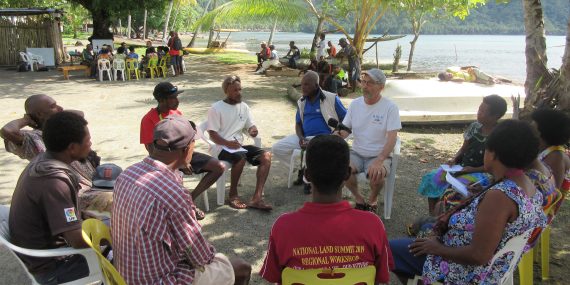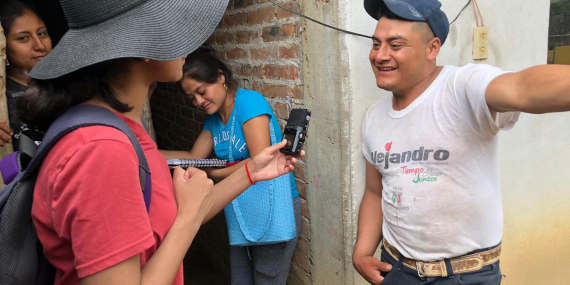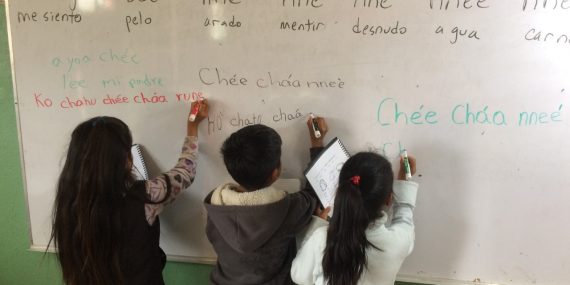
Community researcher Luke Yawasing (light shirt, left of center) and investigator John Wagner (holding recorder, right of center) with a breakout group during a rapid word collection workshop at Apoze, Papua New Guinea. This image is part of DEL-funded work. Photo by Christine Schreyer.
Towards the end of the 20th century, respected scholars began to give a louder voice to the growing crisis of language endangerment and death at a global scale. Linguists have argued that the world’s languages face a very real threat of “mass extinction”. They highlighted the potential loss of information and insight on our collective human cognitive capacity, and also the profound cultural and historical loss that this worldwide threat poses.
U.S. federal funding agency directors and program officers took note of the urgency of this scale of endangerment and also the alarming lack of materials, archival facilities for long-term storage and access, or event financial support for training and documentation activities. They acknowledged (in former NSF director James Herbert’s words) the great need to facilitate the preservation of “human riches” that world languages represent. Herbert specifically described the three main driving factors leading to the establishment of the DEL program: (1) The problem of endangerment as a reduction in the opportunities and environments in which languages may be practiced; (2) The problem of language extinction as an interruption in intergenerational transmission, leading to language death; and, (3) The problem of language erasure, or the vanishing of knowledge that results from large-scale language loss.

Savita Deo learning from Floriana Hernández Martínez and her brother in San Bartolomé Quialana.
Photo credit: Brook Lillehaugen.
The first round of DEL-funded grants was announced in 2005, and included thirteen fellowships and twenty-six institutional grants, representing languages ranging from North and Central America to Africa and Southeast Asia, and also collaborative partnerships and institutes that contributed to the ongoing development of important archival infrastructures such as DELAMAN (Digital Endangered Languages and Musics Archive Network). Since that time, DEL has funded over 300 projects, institutes and conferences. These funded initiatives encompass what might be considered “standard” documentation and materials archiving efforts, but increasingly over time, they have branched out to include cross-disciplinary collaboration and outputs that benefit language revitalization and teaching and also within language-community collaboration and capacity building. These activities have resulted in publications, tools, and infrastructure that have substantially advanced knowledge in the fields of linguistics, cultural anthropology, archaeology, ethnobotany, geography, and information sciences. They have also contributed to significant advances in archival infrastructure, including in syntax (Heath 2016), in phonetics and phonology (DiCanio et al 2015), in areal/historical topics (Good 2013), and in new technologies for documentation (Duong et al 2016).

Triqui children learning to write Triqui tones; San Martín Itunyoso, Oaxaca, México. Photo from June, 2019. (© Christian DiCanio)
Now, in 2019 and 2020, as the NSF restructuring of DEL has resulted in a new program, Dynamic Language Infrastructure – NEH Documenting Endangered Languages (DLI-DEL), we view these past fifteen years as an opportunity for both reflection on many significant achievements, and also for discussion about what directions documentation, archival preservation, and revitalization projects should take for the future. At this same time, the United Nations has declared 2019 to be the International Year of Indigenous Languages (IYIL), and the LSA has committed to tailoring a number of programs and events at its annual meeting and linguistic institute to celebrate indigenous languages, community-centered initiatives and resources for further involvement and investment. The series of DEL-centered events included in this funding request are meant to take place at the LSA meeting in early 2020, to complement this larger theme and its respective programming. This communication is intended to organize events that dovetail with IYIL such that participants in the DEL event can make meaningful connections about worthy initiatives and how they might be supported with federal funds. These events are co-sponsored by the LSA sub-committees: Committee on Endangered Languages and their Preservation (CELP), Linguistics in Higher Education, and Ethics.
The 94th annual meeting for the Linguistic Society of America will be at the Hilton New Orleans Riverside hotel January 2-5, 2020. The Intellectual Merits Symposium and Poster Session will take place on Friday, January 3 and the Broader Impacts Workshop will take place on Sunday, January 5.
NSF BCS 1920687 “Conference: Understanding the Intellectual Merit and Broader Impacts of Fifteen Years of U.S. Federal Funding for Documenting Endangered Languages”
Contact
PI: Kristine Hildebrandt
Co-PI: April Counceller